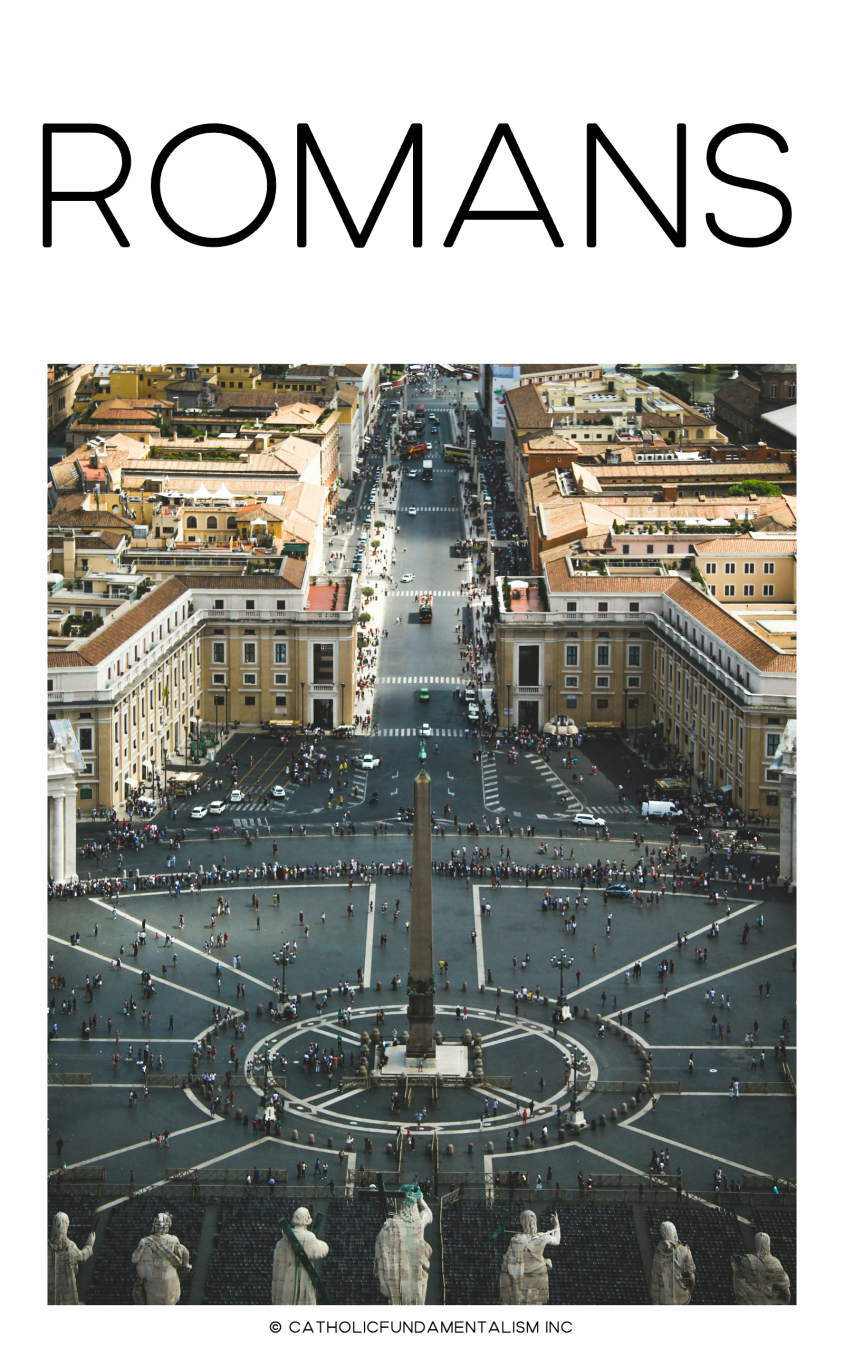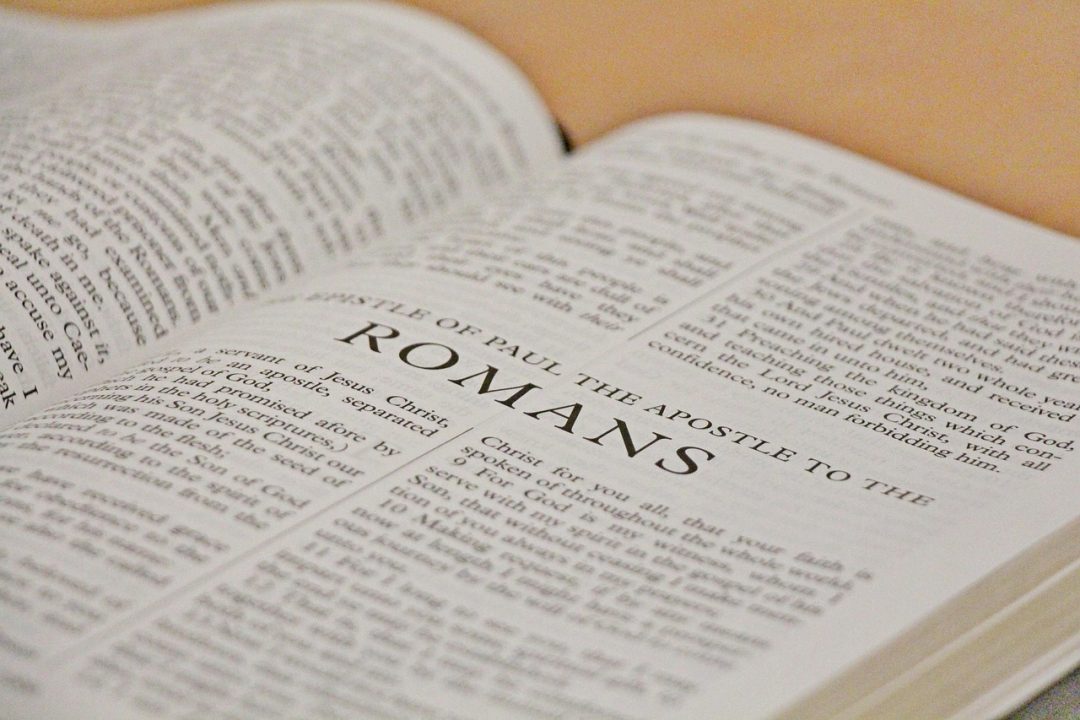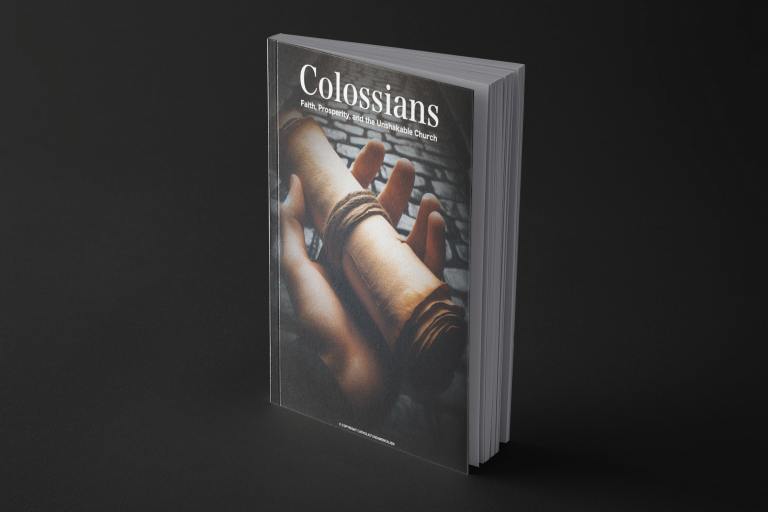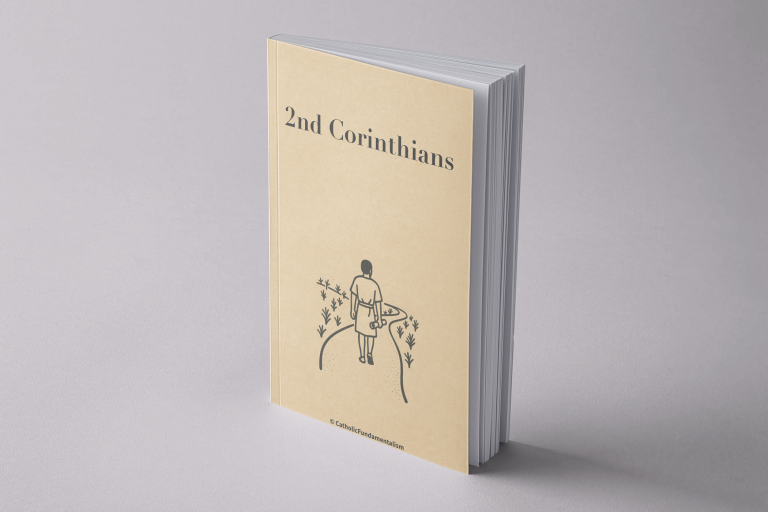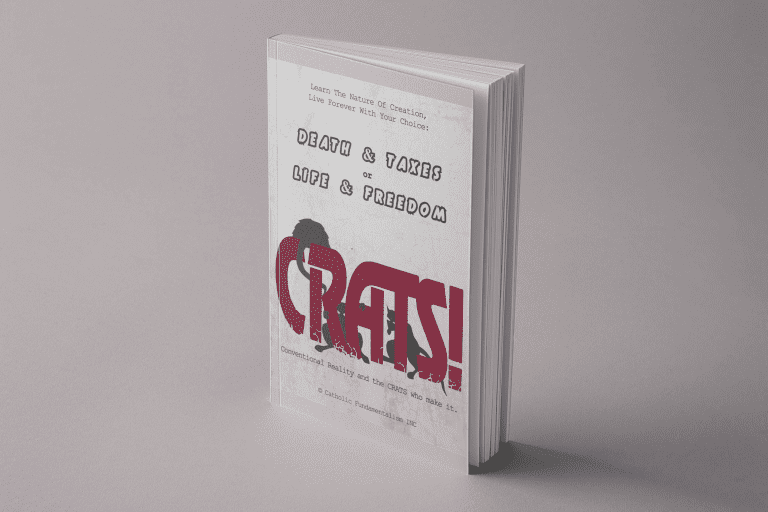The Letter of Paul to the Church in Rome, Wherein Is Contained This Address:
1:1 From Paul, a servant of Christ Jesus who has been called to be an apostle, and specially chosen to preach the Good News that God (St. Paul was shown the way to be Catholic the light of Jesus blinded him while he was on the road to Damascus to destroy the early Catholic Church, many of whose members he had punished by those who followed the example of Judas and became the first anti-Catholic Protestants in History, described in Acts 9:1-30, Acts 22:6-22, Galatians, 1:11-17, 1 Corinthians, 15:2-8, and 2 Corinthians 11:22-33.)
1:2 promised long ago through his prophets in the scriptures.
1:3 This news is about the Son of God who, according to the human nature he took was a descendant of David: (David was descended from Abraham. Abraham was the direct result of God’s “upgrading his DNA”, and was necessary to the conception and birth ofHis Chosen People. That “DNA Upgrade” takes place among the electrons and atoms within the tiny spark of His Catholic People who, like us, are blessed to have our “DNA Upgraded” for the past 2,000 years in the tiny “spark of life” a “holy electron” that fit within the grain of salt at our conception which embodies God’s Download of Our Program.)
1:4 it is about Jesus Christ our Lord who, in the order of the spirit, the spirit of holiness that was in Him, was proclaimed Son of God in all His power through His resurrection from the dead.
1:5 Through Him we received grace and our apostolic mission to preach the obedience of faith to all pagan nations in honor of his name.
1:6 You are one of these nations, (For 2,000 years, at least a hundred billion Catholics in every “nation” have had our “DNA Upgraded” by becoming Catholic) and by His call belong to Jesus Christ. (And are, genetically, “the children of God”.)
1:7 To you all, then, who are God’s beloved in Rome, (Rome would soon hold the largest group of people with Catholic “DNA Upgrades”.) called to be saints, may God our Father and the Lord Jesus Christ send grace and peace.
Thanksgiving and prayer
1:8 First I thank my God through Jesus Christ for all of you and for the way in which your faith is spoken of all over the world. (The first Catholics in Rome were admired by all early Catholics. Protestants had not yet had time to formalize objections to The Church-Creating Word of Jesus to His First Catholic Pope, “And I say unto you thou art Peter and on this Rock I build My Church and the gates of hell shall not prevail against it. It took time for early Protestants to invent ways to modify The Church- Creating Decree of He Who Fulfilled the Prophecies to fit into the countless thousands of Protestant Marketing Plans by which they profited from such vanities.)
1:9 The God I worship spiritually by preaching the Good News of his Son knows that I never fail to mention you in my prayers (May St. Paul’s “prayers” in Heaven continue to include his “prayers” to God on behalf of every Catholic in the world.),
1:10 and to ask to be allowed at long last the opportunity to visit you, if He so wills.
1:11 For I am longing to see you, either to strengthen you by sharing a spiritual gift with you,
1:12 or what is better, to find encouragement among you from our common faith. (St. Paul teaches that it is “better” to receive Spiritual Gift which is “encouragement” about guiding our life with Jesus and His Church than to rely only on “sharing our common faith” with which we are already blessed.)
1:13 I want you to know, brothers, that I have often planned to visit you – though until now I have always been prevented – in the hope that I might work as fruitfully among you as I have done among the other pagans.
1:14 I owe a duty to Greeks just as much as to barbarians, to the educated just as much as to the uneducated, (His God-given “duty”, like ours, is to call people to “the keys to The Kingdom of Heaven”. Those Catholic Sacraments include Communion, which “upgrades The DNA” of all blessed to receive That Holy Food.)=
1:15 and it is this that makes me want to bring the Good News to you too in Rome.
SALVATION BY FAITH begins with JUSTIFICATION:
1:16 For I am not ashamed of the Good News: it is the power of God saving all who have faith – Jews first, but Greeks as well –
1:17 since this is what reveals the justice of God to us: it shows how faith leads to faith, or as scripture says: The upright man finds life through faith. (“Faith” is the foundation for belief according to Habakkuk 2:4.)
GOD’S ANGER AGAINST PAGAN AND JEW begins with His anger against the pagans:
1:18 The anger of God is being revealed from heaven against all the impiety and depravity of men who keep truth imprisoned in their wickedness. (This short sentence lets us know that the root of “depravity” is “keeping truth imprisoned in wickedness”.
We see that happening in what causes the thoughts, words, and deeds of every sinful person of whom we become aware. This simple sentence describes every sin since Melchizedek, who had been “priest forever in the Order of Melchizedek” (Genesis 14:18) began to guide the earliest tribes of people, according to archeological remains, some of which are at least 500,000 years old.)
1:19 For what can be known about God is perfectly plain to them since God Himself has made it plain.
1:20 Ever since God created the world, His everlasting power and deity – however invisible – have been there for the mind to see in the things He has made. That is why such people are without excuse:1:21 they knew God and yet refused to honor him as God or to thank Him; instead, they made nonsense out of logic and their empty minds were darkened. (Those two Passages are worth re-reading to help keep us from making “nonsense” out of “logic” and “reason”!)
1:22 The more they called themselves philosophers, the more stupid they grew, (The world praises such people more as they fall farther from God!):
1:23 until they exchanged the glory of the immortal God for a worthless imitation, for the image of mortal man, of birds, of quadrupeds and reptiles.
1:24 That is why God left them to their filthy enjoyments and the practices with which they dishonor their own bodies, (Such people sadly choose to keep their thoughts and souls “imprisoned in wickedness”.)
1:25 since they have given up divine truth for a lie and have worshipped and served creatures instead of the creator, who is blessed for ever. Amen!
1:26 That is why God has abandoned them to degrading passions: why their women have turned from natural intercourse to unnatural practices (They “abandoned” God, and He “abandoned” them.)
1:27 and why their menfolk have given up natural intercourse to be consumed with passion for each other, men doing shameless things with men and getting an appropriate reward for their perversion. (May all have the courage to understand where “keeping truth imprisoned in wickedness” keeps many souls from God, forever.)
1:28 In other words, since they refused to see it was rational to acknowledge God, God has left them to their own irrational ideas and to their monstrous behavior. (Rejecting rational thought keeps many from seeing the connection well enough to realize that without a Creator, there can be no Creation. The next 3 Passages explain the source of 20 sins that stain such souls):
1:29 And so they are steeped in all sorts of depravity, rottenness, greed and malice, and addicted to envy, murder, wrangling, treachery and spite.
1:30 Libelers, slanderers, enemies of God, rude, arrogant and boastful; enterprising in sin, rebellious to parents,
1:32 without brains, honor, love or pity.
1:33 They know what God’s verdict is: that those who behave like this deserve to die – and yet they do it; and what is worse, encourage others to do the same. (They knowthey are doing wrong, but do not ask God to help them think “rationally” Sinners do wrong, and the worst of them lead others into their sins.)
Wherein the Focus Shifts from the Pagans, and It Is Shown That the Jews Themselves Are Not Exempt from the Just Wrath of God.

2:1 So no matter who you are, if you pass judgment you have no excuse. In judging others you condemn yourself, since you behave no differently from those you judge.
2:2 We know that God condemns that sort of behavior impartially:
2:3 and when you judge those who behave like this while you are doing exactly the same, do you think you will escape God’s judgement? (That specific hypocrisy is so hated by God that St. Paul describes it very precisely.)
2:4 Or are you abusing His abundant goodness, patience and toleration, not realizing that this goodness of God is meant to lead you to repentance? (As Catholic Saints continue to tell us, we must “repent” and seek God’s forgiveness.)
2:5 Your stubborn refusal to repent is only adding to the anger God will have towards you on that day of anger when His just judgements will be made known. (Continued refusal to “repent” increases God’s “anger” toward us as Judgment.)
2:6 He will repay each one as his works deserve. (Is hard to think of a worse punishment than to have not sought God’s “repentance” and be given the punishment we deserve.)
2:7 For those who sought renown and honor and immortality by always doing good there will be eternal life;
2:8 for the unsubmissive who refused to take truth for their guide and took depravity instead, there will be anger and fury.
2:9 Pain and suffering will come to every human being who employs himself in evil – Jews first, but Greeks as well; (May all in those groups understand the lesson being taught by He Who Fulfilled over 300 Prophecies and be blessed with what the next Verse promises!)
2:10 renown, honor and peace will come to everyone who does good – Jews first, but Greeks as well. 2:11 God has no favorites. (Every Profiteer of Protestantism denies That Word of God every time they teach that he and his donors are “God’s Favorites”. That four-word Truth from St. Paul shows the credibility of Every Profiteer of Protestantism in all of History!) St. Paul makes it clear to Jewish believers: The Law will not save them:
2:12 Sinners who were not subject to the Law will perish all the same, without that Law; sinners who were under the Law will have that Law to judge them.
2:13 It is not listening to the Law but keeping it that will make people holy in the sight of God. (Many claim to be “listening to God” while willfully disobeying His Commandments and guidance to every people in History from those in “The Order of Melchizedek”.)
2:14 For instance, pagans who never heard of the Law but are led by reason to do what the Law commands, may not actually ‘possess’ the Law, but they can be said to ‘be’ the Law. (They are more pleasing to God than those who “possess” the Law and ignore it.)
2:15 They can point to the substance of the Law engraved on their hearts – they can call a witness, that is, their own conscience – they have accusation and defense, that is, their own inner mental dialogue. (Good thoughts from our “inner mental dialogue” are “defenses” against damnation by God. The fact that such complicated thoughts in our “mental dialogue” are known by God to let His Judgment be Always Perfect gives us an idea of His Infinite knowledge of the “inner workings” of every mind whose soul He will Judge!):
2:16 …on the day when, according to the Good News I preach, God, through Jesus Christ, judges the secrets of mankind.
2:17 (Five important “Ifs”!): If you call yourself a Jew, if you really trust in the Law and are proud of your God,
2:18 if you know God’s will through the Law and can tell what is right,
2:19 if you are convinced you can guide the blind and be a beacon to those in the dark,
2:20 if you can teach the ignorant and instruct the unlearned because your Law embodies all knowledge and truth, (The next four verses make the importance of consistency clear and clearing our body and mind of evil deeds and desires):
2:21 then why not teach yourself as well as the others? You preach against stealing, yet you steal;2:22 you forbid adultery, yet you commit adultery; you despise idols, yet you rob their temples.
2:23 By boasting about the Law and then disobeying it, you bring God into contempt.
2:24 As scripture says: It is your fault that the name of God is blasphemed among the pagans.
We note St. Paul’s Truth: Circumcision will not save them
2:25 (Three more important “Ifs”!) It is a good thing to be circumcised if you keep the Law; but if you break the Law, you might as well have stayed uncircumcised. (That Verse sums up the price paid by those so proud they think it is good to honor God without obeying Him.)
2:26 If a man who is not circumcised obeys the commandments of the Law, surely that makes up for not being circumcised?
2:27 More than that, the man who keeps the Law, even though he has not been physically circumcised, is a living condemnation of the way you disobey the Law in spite of being circumcised and having it all written down. (Anyone whose behavior contradicts any Teaching of God is warned of the consequences.)
2:28 To be a Jew is not just to look like a Jew, and circumcision is more than a physical operation.
2:29 The real Jew is the one who is inwardly a Jew, and the real circumcision is in the heart – something not of the letter but of the spirit. A Jew like that may not be praised by man, but he will be praised by God.
Wherein We Learn That God’s Promises Do Not Excuse Disobedience.

3:1 Well then, is a Jew any better off? Is there any advantage in being circumcised?
3:2 A great advantage in every way. First, the Jews are the people to whom God’s message was entrusted.
3:3 What if some of them were unfaithful? Will their lack of fidelity cancel God’s fidelity?
3:4 That would be absurd. God will always be true even though everyone proves to be false, so Scripture says: In all you say your justice shows, and when you are judged you win your case.
3:5 But if our lack of holiness makes God demonstrate His integrity, how can we say God is unjust when – to use a human analogy – He gets angry with us in return?
3:6 That would be absurd, it would mean God could never judge the world. (Those who respect The Prophets know that God can, and does “judge the world”. We seek to obey Every Word of He Who Will Judge our immortal souls.)
3:7 You might as well say that since my untruthfulness makes God demonstrate his truthfulness and thus gives Him glory, I should not be judged to be a sinner at all.
3:8 That would be the same as saying: Do evil as a means to good. Some slanderers have accused us of teaching this, but they are justly condemned. (Every insult to Every Word of God is “slander” from “slanderers”.)
All who lock themselves into Laws instead of Faith are guilty
3:9 Well: are we any better off? Not at all: as we said before, Jews and Greeks are all under sin’s dominion.
3:10 As scripture says: There is not a good man left, no, not one: (Psalm 14:1-3)
3:11 there is not one who understands, not one who looks for God.
3:12 All have turned aside, tainted all alike; there is not one good man left, not a single one.
3:13 Their throats are yawning graves; (Psalm 5:9) their tongues are full of deceit. (Ps. 10:7) Vipers’ venom is on their lips, (Psalm 140:3)
3:14 bitter curses fill their mouths. (Psalm 10:7)
3:15 Their feet are swift when blood is to be shed, (Proverbs 1:16, Is 59:7-8)
3:16 wherever they go, there is havoc and ruin.
3:17 They know nothing of the way of peace,
3:18 there is no fear of God before their eyes. (Ps. 36:1)3:19 Now all this that the Law says is said, as we know, for the benefit of those who are subject to the Law, but it is meant to silence everyone and to lay the whole world open to God’s judgment;
3:20 and this is because no one can be justified in the sight of God by keeping the Law: all that law does is to tell us what is sinful.
FAITH AND THE JUSTICE OF GOD is seen by The Revelation of God’s Justice
3:21 God’s justice that was made known through the Law and the Prophets has now been revealed outside the Law,
3:22 since it is the same justice of God that comes through faith to everyone, Jew and pagan alike, who believes in Jesus Christ.
3:23 Both Jew and pagan sinned and forfeited God’s glory,
3:24 and both are justified through the free gift of his grace by being redeemed in Christ Jesus (Jesus has The Power to forgive our sins.)
3:25 Who was appointed by God to sacrifice His life so as to win reconciliation through faith. In this way God makes His justice known; first, for the past, when sins went unpunished because He held His hand,
3:26 then, for the present age, by showing positively that He is just, and that He justifies everyone who believes in Jesus. (May all be blessed to believe enough in Jesus to have our souls blessed by The Seven Catholic Sacraments: Baptism, Confirmation, Eucharist, Reconciliation, Anointing of the Sick, Holy Orders, Marriage.)
What faith does for the faithful
3:27 So what becomes of our boasts? There is no room for them. What sort of law excludes them? The sort of law that tells us what to do? On the contrary, it is the law of faith, (When we think about how many of our thoughts, words, and deeds are centered on our desire to impress others, we know: There may be no greater gift than removing the desire or need to “boast”.)
3:28 since, as we see it, a man is justified by faith and not by doing something the Law tells him to do. (Faith lets us focus on God, not on laws made by those who want to impress us with their power.)3:29 Is God the God of Jews alone and not of the pagans too? Of the pagans too, most certainly,
3:30 since there is only one God, and He is the one who will justify the circumcised because of their faith and justify the uncircumcised through their faith.
3:31 Do we mean that faith makes the Law pointless? Not at all: we are giving the Law its true value. (It’s greatest value is getting us to focus on the greater meaningfulness of God.)
Wherein Abraham Is Justified by Faith, and We See That Grace Makes Us Children of God.
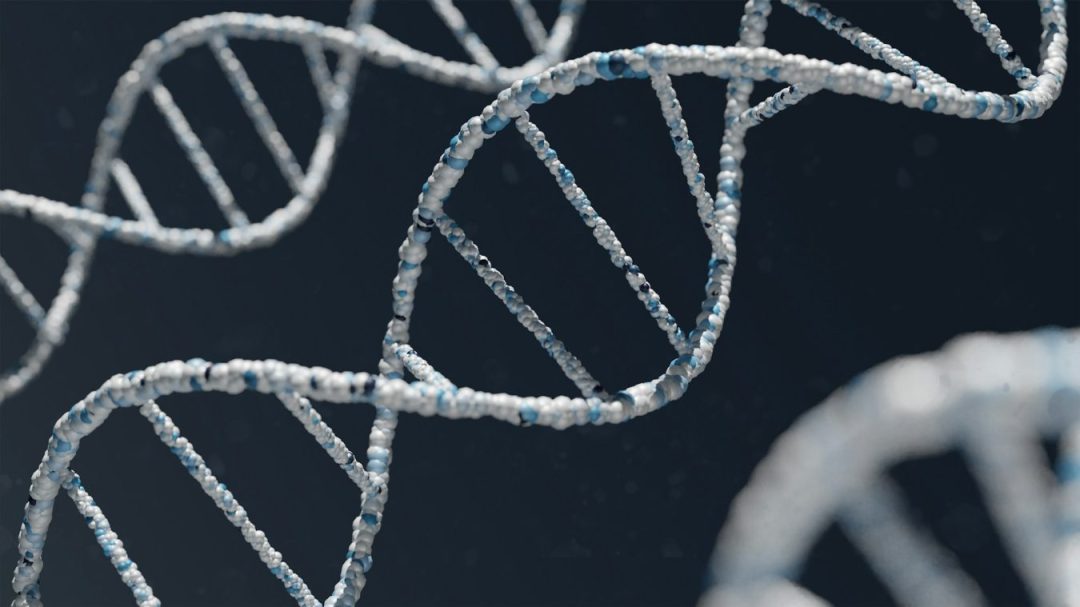
4:1 Apply this to Abraham, the ancestor from whom we are all descended. (We must ask if “Abraham’s DNA Upgrade” let the minds of every person alive today know enough of God’s Power to save our soul by Faith in The Father, Son, and Holy Spirit.)
4:2 If Abraham was justified as a reward for doing something, he would really have had something to boast about, though not in God’s sight
4:3 because scripture says: Abraham put his faith in God, and this faith was considered as justifying him. (May we all be blessed to consider that Abraham’s DNA may have been “upgraded” by changing one, or many, electrons in the atoms of His DNA molecules from positive + to negative – or the opposite!)
4:4 If a man has work to show, his wages are not considered as a favor but as his due;
4:5 but when a man has nothing to show except faith in the one who justifies sinners, then his faith is considered as justifying him.
4:6 And David says the same: a man is happy if God considers him righteous, irrespective of good deeds:
4:7 Happy those whose crimes are forgiven, whose sins are blotted out;
4:8 happy the man whom the Lord considers sinless. (May all have the joy of living according to the “DNA Upgrade” that believing and obeying God may provide.)
Justified before circumcision
4:9 Is this happiness meant only for the circumcised, or is it meant for others as well? Think of Abraham again: his faith, we say, was considered as justifying him,
4:10 but when was this done? When he was already circumcised or before he had been circumcised? It was before he had been circumcised, not after; (This is an important awareness: being Catholics is more than merely being “circumcised”.)
4:11 and when he was circumcised later it was only as a sign and guarantee that the faith he had before his circumcision justified him. In this way Abraham became the ancestor of all uncircumcised believers, so that they too might be considered righteous;
4:12 and ancestor, also, of those who though circumcised do not rely on that fact alone, but follow our ancestor Abraham along the path of faith he trod before he had been circumcised.
We are not justified by obedience to the Law
4:13 The promise of inheriting the world (by having our “DNA Upgraded” by obeying God) was not made to Abraham and his descendants on account of any law but on account of the righteousness which consists in faith.
4:14 If the world is only to be inherited by those who submit to the Law, then faith is pointless and the promise worth nothing. (Many avoid God and focus on endless analysis of His Word. They lack the “faith” that separates souls who are saved from those who reject salvation.)
4:15 Law involves the possibility of punishment for breaking the law – only where there is no law can that be avoided.
4:16 That is why what fulfills the promise depends on faith, so that it may be a free gift and be available to all of Abraham’s descendants, not only those who belong to the Law but also those who belong to the faith of Abraham who is the father of all of us.
4:17 As scripture says: I have made you the ancestor of many nations (Genesis 17:4-5) Abraham is our father in the eyes of God, in whom he put his faith, and who brings the dead to life and calls into being what does not exist.
Abraham’s faith, a model of Christian faith
4:18 Though it seemed Abraham’s hope could not be fulfilled, he hoped and he believed, and through doing so he did become the father of many nations exactly as he had been promised: Your descendants will be as many as the stars. (Genesis 26:4)4:19 Even the thought that his body was past fatherhood – he was about a hundred years old – and Sarah too old to become a mother, did not shake his belief. (We must ask! “Were ‘DNA Upgrades’ downloaded in Abraham and Sarah?)
4:20 Since God had promised it, Abraham refused either to deny it or even to doubt it, but drew strength from faith and gave glory to God,
4:21 convinced that God had power to do what He had promised. (The more anyone disobeys God, the less of His Power they see.)
4:22 This is the faith that was ‘considered as justifying him’.
4:23 Scripture however does not refer only to him but to us as well when it says that his faith was thus ‘considered’;
4:24 our faith too will be ‘considered’ if we believe in Him Who raised Jesus our Lord from the dead, (Is there a better reason to “Be Catholic”?)
4:25 Jesus who was put to death for our sins (Isaiah 53) and raised to life to justify us.
Wherein Salvation Is Shown to Begin by Faith and Be Perfected Through Grace in Christ and His Church.
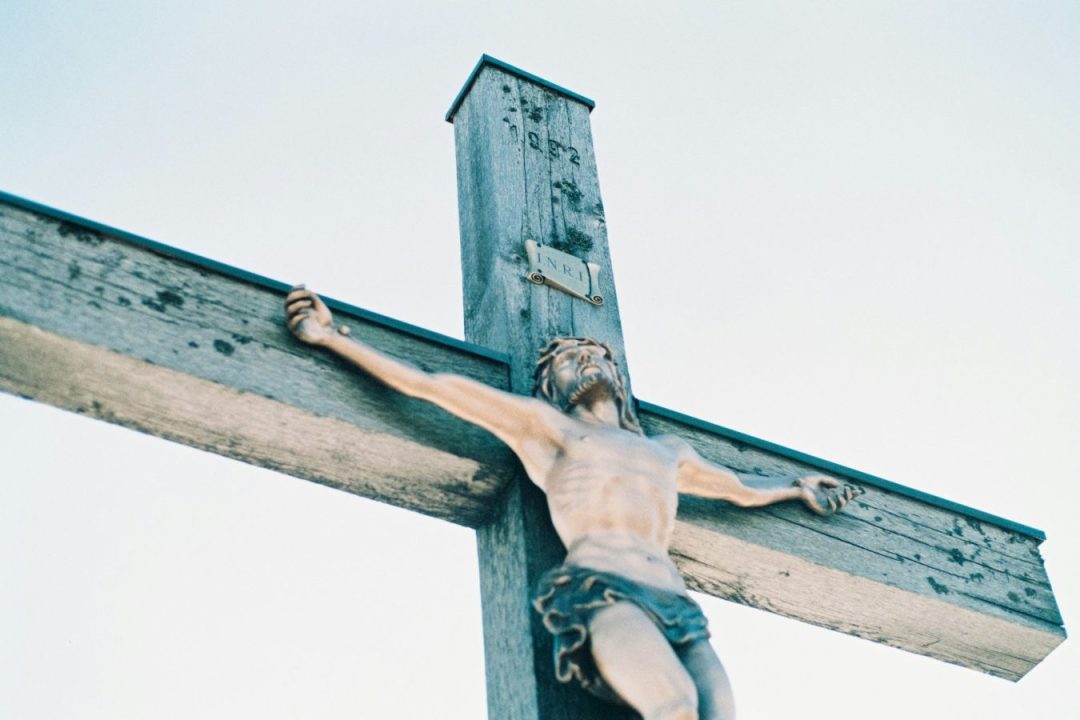
5:1 So far then we have seen that, through our Lord Jesus Christ, by faith we are judged righteous and at peace with God, (But, it is impossible to be “at peace” when confused by Law that keeps us from belief in He Who gave us “faith”.)
5:2 since it is by faith and through Jesus that we have entered this state of grace in which we can boast about looking forward to God’s glory. (May we be blessed to put the word “only “ before “faith and through Jesus”. Then, we have an easier time seeing why we should obey His Church-Creating Decree to Peter, His First Catholic Pope that gives God’s proof to our “faith”!)
5:3 But that is not all we can boast about; we can boast about our sufferings. These sufferings bring patience, as we know,
5:4 and patience brings perseverance, and perseverance brings hope,5:5 and this hope is not deceptive, because the love of God has been poured into our hearts by the Holy Spirit which has been given us. (Again, Catholics have “the love of God poured into our hearts” because we are blessed with ”faith” in and through His One, Holy, Catholic, and Apostolic Church whose “perseverance” against every God-hating evil still gives us “hope” after 2,000 years of The Body of Christ living on earth.)
5:6 We were still helpless (and, “hopeless”!) when at his appointed moment Christ died for sinful men.
5:7 It is not easy to die even for a good man – though of course for someone really worthy, a man might be prepared to die –
5:8 but what proves that God loves us is that Christ died for us while we were still sinners. (This Teaching is important to remember when we deal with ourselves not others who are “sinners”!)
5:9 Having died to make us righteous, is it likely that he would now fail to save us from God’s anger?
5:10 When we were reconciled to God by the death of His Son, we were still enemies; now that we have been reconciled, surely we may count on being saved by the life of His Son?
5:11 Not merely because we have been reconciled but because we are filled with joyful trust in God, through our Lord Jesus Christ, through whom we have already gained our reconciliation. (Every Catholic is blessed with “reconciliation” by the great gift of Jesus to His Catholic priests described in John 20:23: “Those whose sins you forgive on earth are forgiven in Heaven” by making our Confession to, and obtaining Absolution from, His Catholic priests who are given That Power by Jesus.)
DELIVERANCE FROM SIN AND DEATH AND LAW lets us connect Adam and Jesus Christ to each of us:
5:12 Well then, sin entered the world through one man, (Adam) and through sin death, and thus death has spread through the whole human race because everyone has sinned. (Since it was Eve who first ate the “forbidden fruit”, St. Paul is telling us that sin was passed on from Adam, whose “sin” was listening to his wife instead of His Creator!)
5:13 Sin existed in the world long before the Law was given. There was no law and so no one could be accused of the sin of ‘law-breaking’,
5:14 yet death reigned over all from Adam to Moses, even though their sin, unlike that of Adam, was not a matter of breaking a law. Adam prefigured the One to come,5:15 but the gift itself considerably outweighed the fall. If it is certain that through one man’s fall so many died, it is even more certain that divine grace, coming through the one man, Jesus Christ, came to so many as an abundant free gift.
5:16 The results of the gift also outweigh the results of one man’s sin: for after one single fall came judgement with a verdict of condemnation, now after many falls comes grace with its verdict of acquittal. (Every person on earth is blessed with the ability to be “acquitted” by being “absolved” of our sins in The Catholic Sacrament of Confession + Absolution = Reconciliation)
5:17 If it is certain that death reigned over everyone as the consequence of one man’s fall, it is even more certain that one man, Jesus Christ, will cause everyone to reign in life who receives the free gift that he does not deserve, of being made righteous.
5:18 Again, as one man’s fall brought condemnation on everyone, so the good act of one man brings everyone life and makes them justified.
5:19 As by one man’s disobedience many were made sinners, so by one man’s obedience many will be made righteous. (Note that St. Paul says “many will be made righteous”, not “all”!)
5:20 When law came, it was to multiply the opportunities of failing, but however great the number of sins committed, grace was even greater; (Even the most hardened sinner may read that and ask for “Official Forgiveness from God” by confessing to a Catholic priest.)
5:21 and so, just as sin reigned wherever there was death, so grace will reign to bring eternal life thanks to the righteousness that comes through Jesus Christ our Lord. (St. Paul seems to be telling us that Any Sin may be forgiven by “the greater grace of Jesus Christ our Lord.”)
Begins by Discussing “Baptism” with a Simple Question We Should Be Ready to Ask More Often Than We Realize
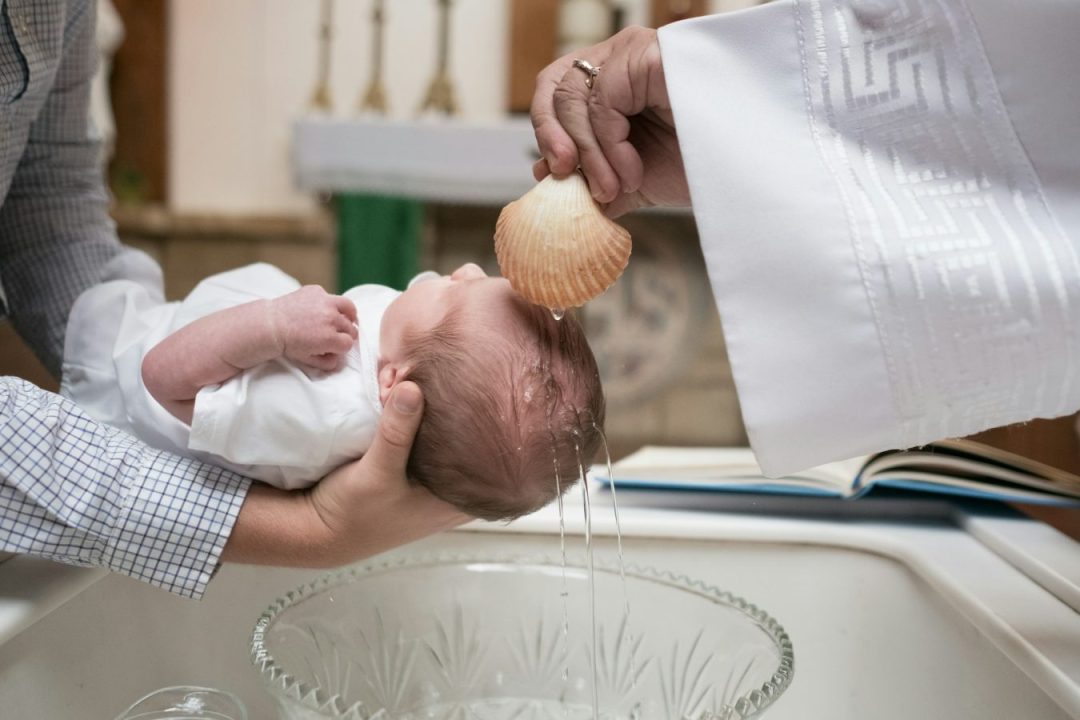
6:1 Does it follow that we should remain in sin so as to let grace have greater scope?
6:2 Of course not. We are dead to sin, so how can we continue to live in it?
6:3 You have been taught that when we were baptized in Christ Jesus we were baptized in his death;6:4 in other words, when we were baptized, we went into the tomb with him and joined him in death, so that as Christ was raised from the dead by the Father’s glory, we too might live a new life. (May all be blessed with this understanding of “Baptism”!)
6:5 If in union with Christ we have imitated his death, we shall also imitate him in his resurrection. (Baptism lets us be “risen from the dead” at what is our “resurrection”. Baptism and Marriage are the only Two Sacraments that Protestant Denominations are able to provide, and they are thereby blessed.)
6:6 We must realize that our former selves have been crucified with him to destroy this sinful body and to free us from the slavery of sin.
6:7 When a Christian dies, of course, he has finished with sin. (We may reasonably conclude that those who do not die as “Christian” are NOT “finished with sin”!)
6:8 But we believe that having died with Christ we shall return to life with him:
6:9 Christ, as we know, having been raised from the dead will never die again. Death has no power over him anymore.
6:10 When he died, he died, once for all, to sin, so his life now is life with God;
6:11 and in that way, you too must consider yourselves to be dead to sin but alive for God in Christ Jesus. (Is there a better reason to “Be Catholic!”?)
Holiness, not sin, to be the master
6:12 That is why you must not let sin reign in your mortal bodies or command your obedience to bodily passions,
6:13 why you must not let any part of your body turn into an unholy weapon fighting on the side of sin; you should, instead, offer yourselves to God, and consider yourselves dead men brought back to life; you should make every part of your body into a weapon fighting on the side of God;
6:14 and then sin will no longer dominate your life, since you are living by grace and not by law. (The demons of pride, envy, greed, gluttony, anger, lust, and sloth are increasingly less influential as we “crucify” those sins with the Growing Power of Baptism that we keep growing within us.)
The Christian is freed from the slavery of sin by St. Paul’s simple answers to This Question:
6:15 Does the fact that we are living by grace and not by law mean that we are free to sin? Of course not.
6:16 You know that if you agree to serve and obey a master you become his slaves. You cannot be slaves of sin that leads to death and at the same time slaves of obedience that leads to righteousness. (Many live in this “Spiritual Schizophrenia”, often encouraged by those seeking donors among the worst Profiteers of Protestantism.)
6:17 You were once slaves of sin, but thank God you submitted without reservation to the creed you were taught. (That removes the endless confusion of bickering about the Law.)
6:18 You may have been freed from the slavery of sin, but only to become ‘slaves’ of righteousness.
6:19 If I may use human terms to help your natural weakness: as once you put your bodies at the service of vice and immorality, so now you must put them at the service of righteousness for your sanctification.
The reward of sin and the reward of holiness are clearly explained:
6:20 When you were slaves of sin, you felt no obligation to righteousness,
6:21 and what did you get from this? Nothing but experiences that now make you blush, since that sort of behavior ends in death.
6:22 Now, however, you have been set free from sin, you have been made slaves of God, and you get a reward leading to your sanctification and ending in eternal life.
6:23 For the wage paid by sin is death; the present given by God is eternal life in Christ Jesus our Lord.
Explains That the Christian Is Not Bound by the Law

7:1 Brothers, those of you who have studied law will know that laws affect a person only during his lifetime. (St. Paul explains we have a “Legal Duty” to be as Catholic as we can while we are alive on earth:
7:2 A married woman, for instance, has legal obligations to her husband while he is alive, but all these obligations come to an end if the husband dies.7:3 So if she gives herself to another man while her husband is still alive, she is legally an adulteress; but after her husband is dead her legal obligations come to an end, and she can marry someone else without becoming an adulteress.
7:4 That is why you, my brothers, who through the body of Christ are now dead to the Law, can now give yourselves to another husband, to him who rose from the dead to make us productive for God. (Christian believers have the same “Legal Duty” that married people do: We must stay as faithful to our God as to our spouse.)
7:5 Before our conversion, our sinful passions, quite unsubdued by the Law, fertilized our bodies to make them give birth to death. (and more of it!)
7:6 But now we are rid of the Law, freed by death from our imprisonment, free to serve in the new spiritual way and not the old way of a written law.
The function of the Law
7:7 Does it follow that the Law itself is sin? Of course not. What I mean is that I should not have known what sin was except for the Law. I should not for instance have known what it means to covet if the Law had not said You shall not covet. (Without the Law, we should not have known that it is a sin to “covet” what others have and that the Law shows that demons are at work in us against it,
7:8 But it was this commandment that sin took advantage of to produce all kinds of covetousness in me, for when there is no Law, sin is dead.
7:9 Once, when there was no Law, I was alive; but when the commandment came, sin came to life (When we were blessed to become “believers”, we were blessed to know we should obey The Lord to whom we were “married”.)
7:10 and I died: the commandment was meant to lead me to life but it turned out to mean death for me,
7:11 because sin took advantage of the commandment to mislead me, and so sin, through that commandment, killed me. (Death is the sentence for all who disobey God Who Gives The Law.)
7:12 The Law is sacred, and what it commands is sacred, just and good.
7:13 Does that mean that something good killed me? Of course not. But sin, to show itself in its true colors, used that good thing to kill me; and thus sin, thanks to the commandment, was able to exercise all its sinful power. (As soon as we become “Believers”, sin takes form in every demon encouraging us to disobey, often by arguingabout the meaning of words in every law. Many let demons led them to death. We may picture them as “evil electrons”, living ions or atoms with negative charges.)
The inward struggle of God with every living evil takes place in all human minds.
7:14 The Law, of course, as we all know, is spiritual; but I am unspiritual; I have been sold as a slave to sin.
7:15 I cannot understand my own behavior. I fail to carry out the things I want to do, and I find myself doing the very things I hate.
7:16 When I act against my own will, that means I have a self that acknowledges that the Law is good,
7:17 and so the thing behaving in that way is not my self but sin living in me. (Catholics are blessed to know that every “sin” wants to be “living” in as many minds as it can. It takes form in the demons of disobedience who work for evil. Each urge for disobedience may be no bigger than an unholy electron that leads us to beliefs that we want in order to justify our disobedience, the way denominations based on Calvin tell us to believe his followers are “Destined to be saved”, no matter what they do.)
7:18 The fact is, I know of nothing good living in me – living, that is, in my unspiritual self – for though the will to do what is good is in me, the performance is not,
7:19 with the result that instead of doing the good things I want to do, I carry out the sinful things I do not want.
7:20 When I act against my will, then, it is not my true self doing it, but sin which lives in me. (All demons of vanity lead us to “divorce” ourselves from God every with ever temptation they encourage “Temptation” may be a tribe of demons that lesser demons call for help.)
7:21 In fact, this seems to be the rule, that every single time I want to do good it is something evil that comes to hand. (Those “evil ions” dance along the highways that connect what is downloaded into the tiny “memory molecules” in our mind.)
7:22 In my inmost self I dearly love God’s Law, but
7:23 I can see that my body follows a different law that battles against the law which my reason dictates. This is what makes me a prisoner of that law of sin which lives inside my body. (Demons literally “imprison” many souls as they try to lock us into sin.)7:24 What a wretched man I am! Who will rescue me from this body doomed to death? (“doomed”) by the confusion of demons battling in my mind.)
7:25 Thanks be to God through Jesus Christ our Lord! In short, it is I who with my reason serve the Law of God, and no less I who serve in my unspiritual self the law of sin’.
Describes the Christian’s Spiritual Life That Gives “Life” to the Spirit
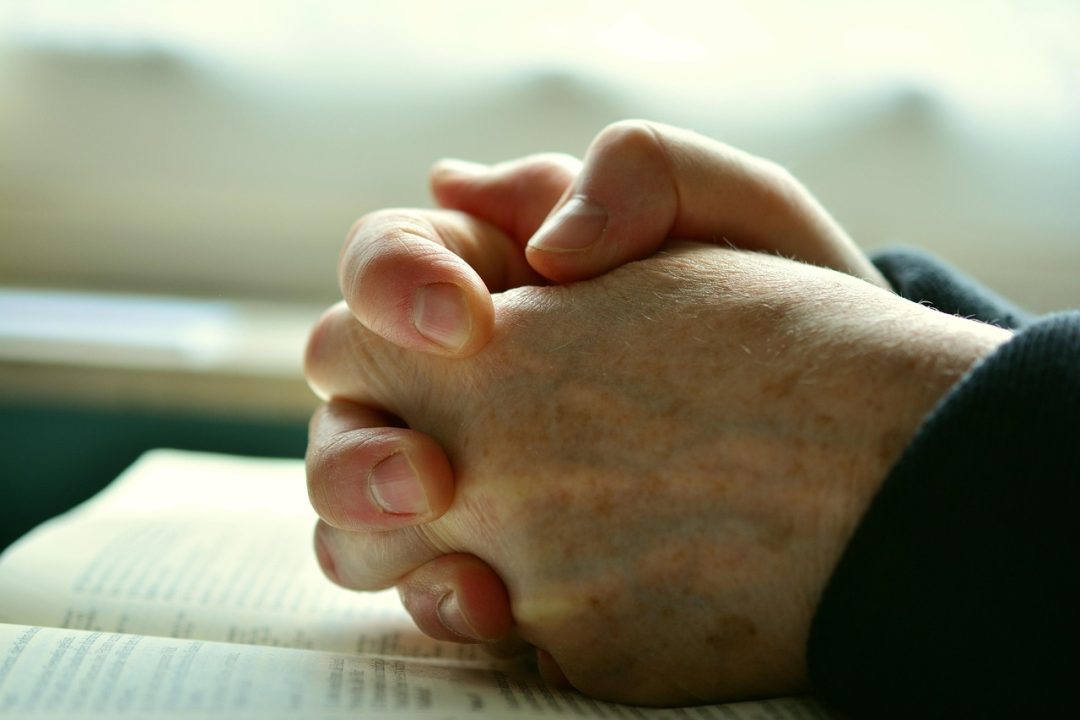
8:1 The reason, therefore, why those who are in Christ Jesus are not condemned,
8:2 is that the law of the spirit of life in Christ Jesus has set you free from the law of sin and death.
8:3 God has done what the Law, because of our unspiritual nature, was unable to do. God dealt with sin by sending his own Son in a body as physical as any sinful body, and in that body God condemned sin. (No matter how many streams of “evil ions” the devil broadcast to Him, none could make Him tell a lie or make an error.)
8:4 He did this in order that the Law’s just demands might be satisfied in us, who behave not as our unspiritual nature but as the spirit dictates. (His Nature was so purely “spiritual” that nothing could lead Him astray.)
8:5 The unspiritual are interested only in what is unspiritual, but the spiritual are interested in spiritual things.
8:6 It is death to limit oneself to what is unspiritual; life and peace can only come with concern for the spiritual.
8:7 That is because to limit oneself to what is unspiritual is to be at enmity with God: such a limitation never could and never does submit to God’s law.
8:8 People who are interested only in unspiritual things can never be pleasing to God. (Is there a better reason than Romans, 8:8 to obey The Only Church-Creating Word of Jesus to His First Catholic Pope: “And I say unto you thou art Peter and on this rock I build My Church and the gates of hell shall not prevail against it. I give you the keys to The Kingdom of Heaven.”?)
8:9 Your interests, (Those who could listen to Words of Jesus from St. Paul and the other early Catholics) however, are not in the unspiritual, but in the spiritual, since theSpirit of God has made his home in you. In fact, unless you possessed the Spirit of Christ you would not belong to him. (This is more joyful to Catholics than anyone!)
8:10 Though your body may be dead it is because of sin, but if Christ is in you then your spirit is life itself because you have been justified (Catholics are justified by Faith in He Who IS Faith!);
8:11 and if the Spirit of him who raised Jesus from the dead is living in you, then he who raised Jesus from the dead will give life to your own mortal bodies through his Spirit living in you. (God, Himself, will give us the best “life” available on earth: The Body and Blood of God’s Son from Catholic priests at Every Catholic Mass for the past 2,000 years!)
8:12 So then, my brothers, there is no necessity for us to obey our unspiritual selves or to live unspiritual lives.
8:13 If you do live in that way, you are doomed to die; but if by the Spirit you put an end to the misdeeds of the body you will live. (Chapter 8 has one reason to be Catholic after another so we may be):
Children of God
8:14 Everyone moved by the Spirit is a son (or daughter!) of God.
8:15 The spirit you received is not the spirit of slaves bringing fear into your lives again; it is the spirit of sons, and it makes us cry out, ‘Abba, Father!’
8:16 The Spirit himself and our spirit bear united witness that we are children of God.
8:17 And if we are children we are heirs as well: heirs of God and coheirs with Christ, sharing his sufferings so as to share his glory.
Glory as our destiny
8:18 I think that what we suffer in this life can never be compared to the glory, as yet unrevealed, which is waiting for us. (Even St. Paul could not “compare” the joys that are “waiting for us” with what awaits us if we remain Faithful!)
8:19 The whole creation is eagerly waiting for God to reveal his sons.
8:20 It was not for any fault on the part of creation that it was made unable to attain its purpose, it was made so by God; but creation still retains the hope8:21 of being freed, like us, from its slavery to decadence, to enjoy the same freedom and glory as the children of God.
8:22 From the beginning till now the entire creation, as we know, has been groaning in one great act of giving birth; (For 13 trillion light-years, God’s Creation Program was downloaded in the eons until The Creation Program had Jesus, The Living Son of God, take human form according to the Predictions of The Prophets that proved the validity of God’s Love for us.)
8:23 and not only creation, but all of us who possess the first-fruits of the Spirit, we too groan inwardly as we wait for our bodies to be set free.
8:24 For we must be content to hope that we shall be saved – our salvation is not in sight, we should not have to be hoping for it if it were –
8:25 but, as I say, we must hope to be saved since we are not saved yet – it is something we must wait for with patience. (We must protect the “faith” with which we Catholics are blessed from every thought and desire which may lead us away from The Loving Programmer, Jesus, The Program in Human Form, and the Love of The Holy Spirit which may be seen in the Holy Verb, “Downloading”.)
8:26 The Spirit too comes to help us in our weakness. For when we cannot choose words in order to pray properly, the Spirit himself expresses our plea in a way that could never be put into words,
8:27 and God who knows everything in our hearts knows perfectly well what he means, and that the pleas of the saints expressed by the Spirit are according to the mind of God.
God has called us to share his glory
8:28 We know that by turning everything to their good God co-operates with all those who love him, with all those that he has, called according to his purpose.
8:29 They are the ones he chose specially long ago and intended to become true images of his Son, so that his Son might be the eldest of many brothers.
8:30 He called those he intended for this; those he called he justified, and with those he justified he shared his glory. (That enlightening “glory” shines in Every Catholic on
earth.)
A hymn to God’s love
8:31 After saying this, what can we add? With God on our side who can be against us? (This heartening Word must be remembered at every temptation to do, say, or think something wrong.)
8:32 ‘Since God did not spare his own Son, but gave him up to benefit us all, we may be certain, after such a gift, that he will not refuse anything he can give. (G0d treats all who strive to be as Catholic as we can with the love He gave His Son!)
8:33 Could anyone accuse those that God has chosen? When God acquits, (and He “acquits” all who remain Catholic until the end!)
8:34 could anyone condemn? Could Christ Jesus? No! He not only died for us – he rose from the dead, and there at God’s right hand he stands and pleads for us.
8:35 Nothing therefore can come between us and the love of Christ, even if we are troubled or worried, or being persecuted, or lacking food or clothes, or being threatened or even attacked.
8:36 As scripture promised: For your sake we are being massacred daily, and reckoned as sheep for the slaughter.
8:37 These are the trials through which we triumph, by the power of him who loved us.
8:38 For I am certain of this: neither death nor life, no angel, no prince, nothing that exists, nothing still to come, not any power,
8:39 or height or depth, nor any created thing, can ever come between us and the love of God made visible in Christ Jesus our Lord.
ROMANS Chapter 9 tells us that Israel has “privileges”. Catholics know that Twelve
Tribes of Israel began to settle the Land God gave them when Moses led them there,
about 1,300 years Before Christ. In those generations between Moses and Jesus, His
people were “fruitful and multiplied”. Every family farm produced more children than
it could support. Countless millions of Israelites migrated and multiplied between India
and Ireland, and between Northern Africa and Scandinavia. The “privileges” of their
genetic background let them become “Children of God”. 2,000 years later their
descendants would include Catholic priests and religious who brought His Word to the
soon to be “brothers and sisters” of The Philippines, North and South America, Africa,
and the rest of the world.
Tells Us That Israel Has “Privileges”

Catholics know that Twelve Tribes of Israel began to settle the Land God gave them when Moses led them there, about 1,300 years Before Christ. In those generations between Moses and Jesus, His people were “fruitful and multiplied”. Every family farm produced more children than it could support. Countless millions of Israelites migrated and multiplied between India and Ireland, and between Northern Africa and Scandinavia. The “privileges” of their genetic background let them become “Children of God”. 2,000 years later their descendants would include Catholic priests and religious who brought His Word to the soon to be “brothers and sisters” of The Philippines, North and South America, Africa, and the rest of the world.
~
9:1 What I want to say now is no pretense; I say it in union with Christ – it is the truth – my conscience in union with the Holy Spirit assures me of it too.9:2 What I want to say is this: my sorrow is so great, my mental anguish so endless,
9:3 I would willingly be condemned and be cut off from Christ if it could help my brothers of Israel, my own flesh and blood. (That may be the most extreme expression of “brotherly love” in the entire Bible!)
9:4 They were adopted as sons, they were given the glory and the covenants; the Law and the ritual were drawn up for them, and the promises were made to them.
9:5 They are descended from the patriarchs and from their flesh and blood came Christ who is above all, God for ever blessed! Amen. (We see The First Two Persons of The Holy Trinity in that important Verse!)
God has kept his promise
9:6 Does this mean that God has failed to keep his promise? Of course not. Not all those who descend from Israel are Israel;
9:7 not all the descendants of Abraham are his true children. Remember: It is through Isaac that your name will be carried on,
9:8 which means that it is not physical descent that decides who are the children of God; it is only the children of the promise who will count as the true descendants. (May we all ask God to make us “children of The Promise” by being as Catholic as we can!)
9:9 The actual words in which the promise was made were: I shall visit you at such and such a time, and Sarah will have a son. (Genesis 18:10)
9:10 Even more to the point is what was said to Rebecca when she was pregnant by our ancestor Isaac,
9:11 but before her twin children were born and before either had done good or evil. In order to stress that God’s choice is free,
9:12 since it depends on the one who calls, not on human merit, Rebecca was told: the elder shall serve the younger,
9:13 or as scripture says elsewhere: I showed my love for Jacob and my hatred for Esau. (Malachi 1:2-3: “I have loved you.”, but then asks “Was not Esau Jacob’s brother? Yet God loved Jacob, but hated Esau. I made his mountains a waste, his heritage a desert for jackals.” The sons of Esau are among us still, encouraging every lunacy from excessive environmentalism to every other sinful vanity on earth, as they prowl about their “desert for jackals”.)God is not unjust
9:14 Does it follow that God is unjust? Of course not.
9:15 Take what God said to Moses: I have mercy on whom I will, and I show pity to whom I please. (Can even the “jackals in their deserts” receive His pity?)
9:16 In other words, the only thing that counts is not what human beings want or try to do, but the mercy of God. (Those blessed to read St. Faustina’s book, “The Diary of St. Faustina” which is available on the catholicfundamentalism.com website, will see how important that single sentence in Romans 9:16 is!)
9:17 For in scripture he says to Pharaoh: It was for this I raised you up, to use you as a means of showing my power and to make my name known throughout the world.
9:18 In other words, when God wants to show mercy he does, and when he wants to harden someone’s heart he does so. (Then, He uses that “hardened heart” to show His Power!)
9:19 You will ask me, ‘In that case, how can God ever blame anyone, since no one can oppose His will?’ (That “you” is every person looking for an excuse to remain with “the jackals in their desert” and tells God: “It is Your fault that I live in the desert that You created for the sons of Esau.” St. Paul erases that excuse with a simple question!):
9:20 But what right have you, a human being, to cross-examine God? The pot has no right to say to the potter: Why did you make me this shape?
9:21 Surely a potter can do what he likes with the clay? It is surely for him to decide whether he will use a particular lump of clay to make a special pot or an ordinary one?
9:22 (Then, St. Paul gives another explanation for the “desert for jackals”): Or else imagine that although God is ready to show his anger and display his power, yet he patiently puts up with the people who make him angry, however much they deserve to be destroyed.
9:23 He puts up with them for the sake of those other people, to whom he wants to be merciful, to whom he wants to reveal the richness of his glory, people he had prepared for this glory long ago.
9:24 Well, we are those people; whether we were Jews or pagans we are the ones he has called.
All in The New Testament has been foretold in the Old
9:25 That is exactly what God says in Hosea (2;23): I shall say to a people that was not mine, ‘You are my people’, and to a nation I never loved, ‘I love you’.
9:26 Instead of being told, ‘You are no people of mine’, they will now be called the sons of the living God. (Hosea 2:23: “I will pity those who are not pitied, and I will say to those who are not my people. Now, you are My people”. God’s “people” will be identified because they say what every converted Catholic has said for 2,000 years: “You are our God.”
9:27 Referring to Israel, Isaiah had this to say: Though Israel should have many descendants as there are grains of sand on the seashore, only a remnant will be saved,
9:28 for without hesitation or delay the Lord will execute his sentence on the earth.
9:29 As Isaiah foretold: had the Lord of hosts not left us some descendants we should now be like Sodom, we should be like Gomorrah. (Typical of cities inhabited by “jackals living in the desert.”)
9:30 From this it follows that the pagans who were not looking for righteousness found it all the same, a righteousness that comes of faith,
9:31 while Israel, looking for a righteousness derived from law failed to do what that law required. (N0w, “God’s Children” have been both identified and justified. Now, St. Paul tells us why they “failed”):
9:32 Why did they fail? Because they relied on good deeds instead of trusting in faith. In other words, they stumbled over the stumbling-stone (All Protestantism is united in believing they will be saved even though they are not “trusting in faith” when facing Jesus and His Church, now led by the 268th Successor to Peter.)
9:33 mentioned in scripture: “See how I lay in Zion a stone to stumble over, a rock to trip men up – only those who believe in him will have no cause for shame. ” (Isaiah
28:16 makes it clear that belief in God instead of those who distract us from Him is necessary for Salvation.)
Explains That Israel Fails to See That It Is God Who Makes Us Holy
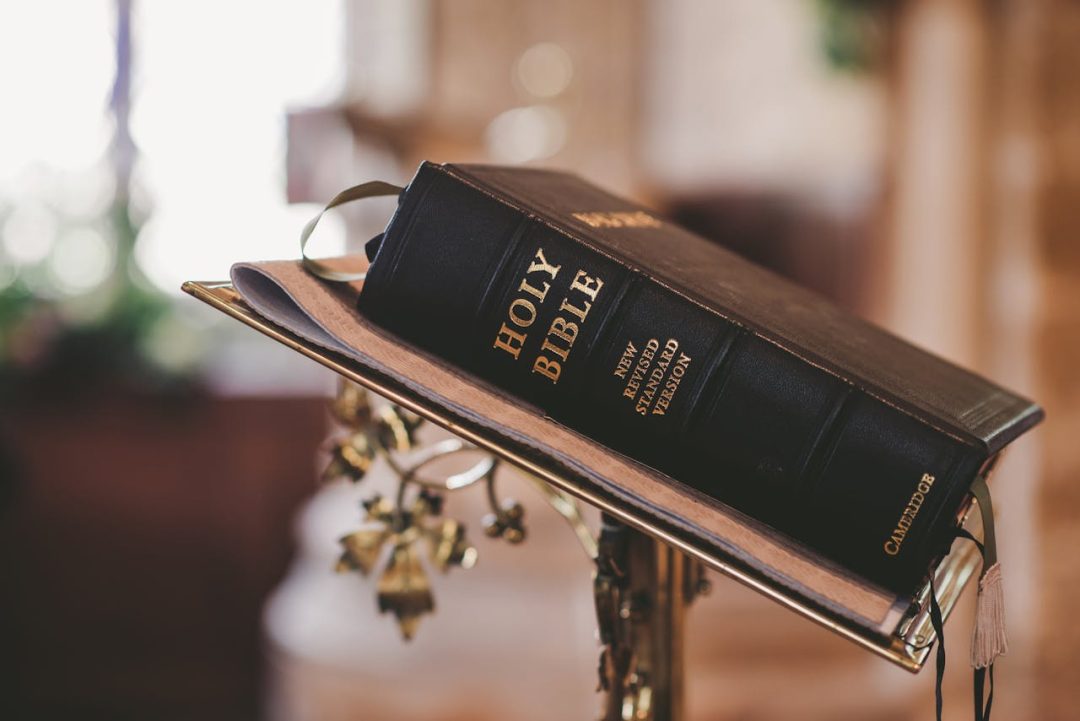
10:1 Brothers, I have the very warmest love for the Jews, and I pray to God for them to be saved.
10:2 I can swear to their fervor for God, but their zeal is misguided. (Again, every Protestant on earth is described as having “misguided zeal”. The word “Protestant” is better defined in time by using that word instead of the usual “Jew”.)
10:3 Failing to recognize the righteousness that comes from God, they try to promote their own idea of it, instead of submitting to the righteousness of God. (In three Verses, St. Paul again defines every Protestant who ever lived!”)
10:4 But now the Law has come to an end with Christ, and everyone who has faith may be justified. (Jews and Protestants share the same lack of “faith” in Christ’s Church- Creating Word! Is it more insulting to God and His Prophets to reject Christ’s Fulfillment of the Prophecies or to pick out Words of Jesus that we like and reject the rest? May we all realize that “Disobedience is disobedience.” and ask God to save us from every kind of disobedience, no matter what we call it.)”
The testimony of Moses, Dt. 30:15-20
10:5 When Moses refers to being justified by the Law, he writes: those who keep the Law will draw life from it. (One example is Baruch 4:1)
10:6 But the righteousness that comes from faith says this: Do not tell yourself you have to bring Christ down – as in the text: Who will go up to heaven?
10:7 or that you have to bring Christ back from the dead – as in the text: Who will go down to the underworld?
10:8 On the positive side it says: The word, that is the faith we proclaim, is very near to you, it is on your lips and in your heart.
10:9 If your lips confess that Jesus is Lord and if you believe in your heart that God raised him from the dead, then you will be saved. (May that belief take form by being in The Only Church Spoken Into Being by Jesus Christ, Himself to His First Catholic Pope, ‘And I say unto you . . . “.)
10:10 By believing from the heart you are made righteous; by confessing with your lips you are saved. (The opposite is also truth: If anyone refuses to be “confessing with your lips” will not be “saved”.)
10:11 When scripture says: those who believe in him will have no cause for shame. (Isaiah 45:17)10:12 it makes no distinction between Jew and Greek: all belong to the same Lord who is rich enough, however many ask his help,
10:13 for everyone who calls on the name of the Lord will be saved. (Mt.7:21-23)
Israel has no excuse
10:14 But they will not ask his help unless they believe in him, and they will not believe in him unless they have heard of him, and they will not hear of him unless they get a preacher,
10:15 and they will never have a preacher unless one is sent, but as scripture says: The footsteps of those who bring good news is a welcome sound. (Isaiah 52:7)
10:16 Not everyone, of course, listens to the Good News. As Isaiah says: Lord, how many believed what we proclaimed? (Isaiah 53:1)
10:17 So faith comes from what is preached, and what is preached comes from the word of Christ. (And from His Church, led by The First Catholic Pope to whom The Prophesied Messiah said: “Thou art Peter and on this rock I build My Church . . .”, Mt. 16:18-20)
10:18 Let me put the question: is it possible that they did not hear? Indeed they did; in the words of the psalm, their voice has gone out through all the earth, and their message to the ends of the world. (May all be blessed to learn from Isaiah 53-55 and “ in deed” obey God’s Church-Creating Word!)
10:19 A second question: is it possible that Israel did not understand? Moses answered this long ago: I will make you jealous of people who are not even a nation; I will make you angry with an irreligious people. (Deuteronomy 32:21)
10:20 Isaiah said more clearly: I have been found by those who did not seek me, and have revealed myself to those who did not consult me: (Isaiah 65:1)
10:21 and referring to Israel he goes on: Each day I stretched out my hand to a disobedient and rebellious people. (No one “stretched out his hands” more than Jesus on the cross, He to Whom this prophetic verse from Isaiah 65:2 refers!)
Describes What Must Happen to the Remnant of Israel
11:1 Let me put a further question then: is it possible that God has rejected His people? Of course not. I, an Israelite, descended from Abraham through the tribe of Benjamin,
11:2 could never agree that God had rejected His people, the people he chose specially long ago. Do you remember what scripture says of Elijah – how he complained to God about Israel’s behavior? (1 Kings 19:10)
11:3 “Lord, they have killed your prophets and broken down your altars. I, and I only, remain, and they want to kill me.” (1 Kings 19:18)
11:4 What did God say to that? “I have kept for myself seven thousand men who have not bent the knee to Baal.”
11:5 Today the same thing has happened: there is a remnant, chosen by grace.
11:6 By grace, you notice, nothing therefore to do with good deeds, or grace would not be grace at all!
11:7 What follows? It was not Israel as a whole that found what it was seeking, but only the chosen few. The rest were not allowed to see the truth;
11:8 as scripture says: God has given them a sluggish spirit, unseeing eyes and inattentive ears, and they are still like that today. (Is there a better description of the Victims of Unbelief?)
11:9 And David says: May their own table prove a trap for them, a snare and a pitfall – let that be their punishment; (Psalm 69:22)
11:10 may their eyes be struck incurably blind, their backs bend forever. (Psalm 69:23) Many to whom that awful curse is directed have been “snared” and “trapped” in the “pitfall”.)
The Jews will be restored in the future
11:11 Let me put another question then: have the Jews fallen forever, or have they just stumbled? Obviously, they have not fallen forever: their fall, though, has saved the pagans in a way the Jews may now well emulate. (Two questions come to mind! 1. 2. Is every Jewish person who rejected Jesus for the past 2,000 years somehow “restored”? Is every Protestant guilty of similar disobedience to The Church-Creating Word of Jesus and refuses to be Catholic equally able to be saved?)
11:12 Think of the extent to which the world, the pagan world, has benefited from their fall and defection – then think how much more it will benefit from the conversion of them all.
11:13 Let me tell you pagans this: I have been sent to the pagans as their apostle, and I am proud of being sent,
11:14 but the purpose of it is to make my own people envious of you, and in this way save some of them.
11:15 Since their rejection meant the reconciliation of the world, do you know what their admission will mean? Nothing less than a resurrection from the dead!
The Jews are still the chosen people.
(DNA studies show that The Twelve Tribes of Israel spread between Ireland, India, and beyond as their overcrowded farms sent settlers to distant places during the 1,400 years between Moses and Jesus. We must realize many people and peoples, as with some Celts, Danes, Gadenes, and the Saxons may be “Isaac’s Sons” and carried Abraham’s Blessed DNA throughout the world. Many peoples are unknowingly of “Jewish” descent, despite their distance in time and space from Israel.)
11:16 A whole batch of bread is made holy if the first handful of dough is made holy; all the branches are holy if the root is holy. (Every person can know that if 1% of the dough is “yeast”, the “bread” will rise. Does every person need to be at least 1% Catholic in our beliefs to be saved?)
11:17 No doubt some of the branches have been cut off, and, like shoots of wild olive, you have been grafted among the rest to share with them the rich sap provided by the olive tree itself, (Are the “branches which are cut off” separated from God forever? Is there a difference between “branches that have been cut off” and “branches” that cut themselves off? More questions for both Jewish and Protestant Believers!)
11:18 (All anti-Catholics are described:) but still, even if you think yourself superior to the other branches, remember that you do not support the root; it is the root that supports you. (Has everyone who is anti-Jewish been led to “cut off” their own precious beings from God?)
11:19 You will say, ‘Those branches were cut off on purpose to let me be grafted in!’ True,
11:20 they were cut off, but through their unbelief; if you still hold firm, it is only thanks to your faith. Rather than making you proud, that should make you afraid. (If there were not punishment for willfully rejecting Any Word of God, no one would be “afraid”.)
11:21 God did not spare the natural branches, and he is not likely to spare you. (These Passages lead many Jewish and Protestant Believers to “Be Catholic!”)
11:22 Do not forget that God can be severe as well as kind: He is severe to those who fell, and He is kind to you, but only for as long as He chooses to be, otherwise you will find yourself cut off too,
11:23 and the Jews, if they give up their unbelief, grafted back in your place. God is perfectly able to graft them back again;
11:24 after all, if you were cut from your natural wild olive to be grafted unnaturally onto a cultivated olive, it will be much easier for them, the natural branches, to be grafted back onto the tree they came from.
The conversion of the Jews
11:25 There is a hidden reason for all this, brothers, of which I do not want you to be ignorant, in case you think you know more than you do. (Again, many Jewish and Protestant Believers think they “know more than they do”!) One section of Israel has become blind, but this will last only until the whole pagan world has entered, (We approach the 2,000th Anniversary of The Foundation of The Catholic Church by The Church-Creating Word of Jesus to His First Catholic Pope in 2033: “And I say unto you, thou art Peter and on this rock I build My Church and the gates of hell shall not prevail against it. I give you the keys to The Kingdom of Heaven.” May all be blessed to consider the importance of the year 2033 and the time that follows.)
11:26 and then after this, the rest of Israel will be saved as well. As Scripture says: “The liberator will come from Zion, he will banish godlessness from Jacob.” (Joel 2:32)
11:27 And this is the covenant I will make with them when I take their sins away. (Isaiah 59:21)
11:28 The Jews are enemies of God only with regard to the Good News, and enemies only for your sake (Their endless criticisms of Christian, and especially, Catholic beliefs, are your blessed tests!) ; but as the chosen people, they are still loved by God, loved for the sake of their ancestors.
11:29 God never takes back his gifts or revokes His choice.
11:30 Just as you changed from being disobedient to God, and now enjoy mercy because of their disobedience,
11:31 so those who are disobedient now – and only because of the mercy shown to you – will also enjoy mercy eventually.
11:32 God has imprisoned all men in their own disobedience only to show mercy to all mankind. (This is mystifying! Can even hardened sinners escape the eternal fires of hell? Every Catholic, in fact, every intelligent person on earth, has been puzzled!
We see an answer from St. Faustina, #1198!
“God’s mercy sometimes touches the sinner at the last moment in a wondrous and mysterious way. Outwardly, it seems as if everything is lost, but it is not so. The soul, illumined by a ray of God’s powerful, final grace, turns to God in the last moment with such a power of love that, in an instant, it receives from God forgiveness of sin while outwardly it shows no sign received from God forgiveness of sin and punishment, while outwardly it shows no sign of either repentance or of contrition, because souls at that stage no longer react to external things. [Has the soul at the moment of death withdrawn into itself so completely it is no longer connected with its mind and body?]
Then, St. Faustina continues to enlighten us:
“Oh, how beyond comprehension is God’s Mercy! But – horror! – there are also souls who voluntarily and consciously reject and scorn this grace! Although a person is at the point of death, the merciful God gives the soul that interior vivid moment, so that if the soul is willing, it has the possibility of returning to God. But, sometimes, the obduracy in souls is so great that consciously they choose hell: they [thus] make useless all the prayers that other souls offer to God for them and even the efforts of God Himself.”
May we pray that no one refuses The Final Mercy of God that was revealed to St. Faustina with the teaching of Jesus about the many, many souls for whom she prayed during their last moments on earth.)
A hymn to God’s mercy and wisdom
11:33 How rich are the depths of God – how deep His wisdom and knowledge – and how impossible to penetrate His motives or understand His methods!
11:34 Who could ever know the mind of the Lord? Who could ever be His counsellor?
11:35 Who could ever give Him anything or lend Him anything?
11:36 All that exists comes from Him; all is by Him and for Him. To Him be glory for ever! Amen.
Where an Exhortation to Focus on Spiritual, Not Legalistic, Worship Is Given

12:1 (A first step to Heaven is to): Think of God’s mercy, my brothers, and worship him, I beg you, in a way that is worthy of thinking beings, by offering your living bodies as a holy sacrifice, truly pleasing to God. (May every soul, mind, and body “offer” ourselves to God as a “holy sacrifice”!)12:2 Do not model yourselves on the behavior of the world around you, but let your behavior change, modelled by your new mind. This is the only way to discover the will of God and know what is good, what it is that God wants, what is the perfect thing to do.
After we “Think of God’s Mercy”, Humility and charity are steps toward God and Heaven:
12:3 In the light of the grace I have received I want to urge each one among you not to exaggerate his real importance. Each of you must judge himself soberly by the standard of the faith God has given him. (The most universal mistake we all make is the: “exaggeration of our real importance”!)
12:4 Just as each of our bodies has several parts and each part has a separate function,
12:5 so all of us, in union with Christ, form one body, and as parts of it we belong to each other. (Whose “body” are those who reject The Catholic Church in? If we are part of His Body on Earth, we are expected to utilize the gifts we have been given on Her behalf.):
12:6 Our gifts differ according to the grace given us. If your gift is prophecy, then use it as your faith suggests;
12:7 if administration, then use it for administration; if teaching, then use it for teaching.
12:8 Let the preachers deliver sermons, the almsgivers give freely, the officials be diligent, and those who do works of mercy do them cheerfully. (A “key word” to remember is to do our duty “cheerfully”! Five other “Holy Adverbs” apply in the next verses: “Sincerely”, “respectfully”, “untiringly”, “earnestly”, and “hospitably”.)
12:9 Do not let your love be a pretense, but sincerely prefer good to evil.
12:10 Love each other as much as brothers should, and have a profound respect for each other.
12:11 Work for the Lord with untiring effort and with great earnestness of spirit.
12:12 If you have hope, this will make you cheerful. Do not give up if trials come; and keep on praying.
12:13 If any of the saints are in need you must share with them; and you should make hospitality your special care.All believers are given these “Twelve Marching Orders” that are “Commands” to Catholics:
12:14 Bless those who persecute you: never curse them, bless them. we see that it is a great help for us and for them!) (After we try this,
12:15 Rejoice with those who rejoice and be sad with those in sorrow.
12:16 Treat everyone with equal kindness; never be condescending but make real friends with the poor. Do not allow yourself to become self-satisfied.
12:17 Never repay evil with evil but let everyone see that you are interested only in the highest ideals.
12:18 Do all you can to live at peace with everyone.
12:19 Never try to get revenge; leave that, my friends, to God’s anger. As scripture says: vengeance is mine – I will pay them back, (Dt 32:35) the Lord promises.
The last two commands are important:
12:20 But there is more: If your enemy is hungry, you should give him food, and if he is thirsty, let him drink. Thus you heap red-hot coals on his head. (Proverbs 25:22)
12:21 Resist evil and conquer it with good.
Gives Us Catholics More “Marching Orders” That Begin by Teaching Us to Submit to Civil Authorities

13:1 You must all obey the governing authorities. Since all government comes from God, the civil authorities were appointed by God, (We do not let political discussions include hatred.)13:2 and so anyone who resists authority is rebelling against God’s decision, and such an act is bound to be punished.
13:3 Good behavior is not afraid of magistrates; only criminals have anything to fear. If you want to live without being afraid of authority, you must live honestly, and authority may even honor you.
13:4 The state is there to serve God for your benefit. If you break the law, however, you may well have fear: the bearing of the sword has its significance. The authorities are there to serve God: they carry out God’s revenge by punishing wrongdoers.
13:5 You must obey, therefore, not only because you are afraid of being punished, but also for conscience’s sake.
13:6 This is also the reason why you must pay taxes, since all government officials are God’s officers. They serve God by collecting taxes. (This is often difficult to understand.)
13:7 Pay every government official what he has a right to ask – whether it be direct tax or indirect, fear or honor.
Love and law
13:8 (Disobeying this “Marching Order” causes huge problems for people and families!): Avoid getting into debt, except the debt of mutual love. If you love your fellow men you have carried out your obligations.
13:9 All the commandments: You shall not commit adultery, you shall not kill, you shall not steal, you shall not covet, and so on, are summed up in this single command: You must love your neighbor as yourself.
13:10 Love is the one thing that cannot hurt your neighbor; that is why it is the answer to every one of the commandments. (People fall into hurtful desires because every time we fail to “love”.)
Children of the light
13:11 Besides, you know ‘the time’ has come: you must wake up now: our salvation is even nearer than it was when we were converted.
13:12 The night is almost over, it will be daylight soon – let us give up all the things we prefer to do under cover of the dark; let us arm ourselves and appear in the light. (Every sin is seen by God. The more we try to hide, the worse we become.)13:13 Let us live decently as people do in the daytime: no drunken orgies, no promiscuity or licentiousness, and no wrangling or jealousy.
13:14 Let your armor be the Lord Jesus Christ; forget about satisfying your bodies with all their cravings.
Tells Us to Have Charity Towards the Scrupulous—Those Trying to Be as Pleasing to God as They Can

14:1 If a person’s faith is not strong enough, welcome him all the same without starting an argument. (It is best to make our points with our deeds, not words.)
14:2 People range from those who believe they may eat any sort of meat to those whose faith is so weak they dare not eat anything except vegetables. (This reminds us that even those seeking approval from popular dietary marketing plans and other such fads have souls that may be saved.)
14:3 Meat-eaters must not despise the scrupulous. On the other hand, the scrupulous must not condemn those who feel free to eat anything they choose, since God has welcomed them. (Love and toleration is a two-way street! “Scrupulosity” is a word that also identifies a whole tribe of demons that let details keep us from God.)
14:4 It is not for you to condemn someone else’s servant: whether he stands or falls it is his own master’s business; he will stand, you may be sure, because the Lord has power to make him stand.
14:5 If one man keeps certain days as holier than others, and another considers all days to be equally holy, each must be left free to hold his own opinion. (Personal opinions do not keep people from being saved, no matter what many think of those who hold them.)
14:6 The one who observes special days does so in honor of the Lord. The one who eats meat also does so in honor of the Lord, since he gives thanks to God; but then the man who abstains does that too in honor of the Lord, and so he also gives God thanks. (All who seek to show Love for God are one in His Sight.)
14:7 The life and death of each of us has its influence on others;
14:8 if we live, we live for the Lord; and if we die, we die for the Lord, so that alive or dead we belong to the Lord.14:9 This explains why Christ both died and came to life, it was so that he might be Lord both of the dead and of the living.
14:10 This is also why you should never pass judgement on a brother or treat him with contempt, as some of you have done. We shall all have to stand before the judgement seat of God; (We must never let what others do keep us from including them among “Love your neighbor as yourself.”)
14:11 as scripture says: By my life – it is the Lord who speaks – every knee shall bend before me, and every tongue shall praise God. (Philippians 2:10-11, Isaiah 45:23)
14:12 It is to God, therefore, that each of us must give an account of himself.
14:13 Far from passing judgement on each other, therefore, you should make up your mind never to be the cause of your brother tripping or falling. (Hating our neighbor often causes them to hate us, magnifying the damage to souls.)
14:14 Now I am perfectly well aware, of course, and I speak for the Lord Jesus, that no food is unclean in itself; however, if someone thinks that a particular food is unclean, then it is unclean for him.
14:15 And indeed if your attitude to food is upsetting your brother, then you are hardly being guided by charity. You are certainly not free to eat what you like if that means the downfall of someone for whom Christ died. (We must never let anyone’s personal beliefs keep us from loving our neighbor by showing respect.)
14:16 In short, you must not compromise your privilege,
14:17 because the Kingdom of God does not mean eating or drinking this or that, it means righteousness and peace and joy brought by the Holy Spirit.
14:18 If you serve Christ in this way you will please God and be respected by men.
14:19 So let us adopt any custom that leads to peace and our mutual improvement;
14:20 do not wreck God’s work over a question of food. Of course all food is clean, but it becomes evil if by eating it you make somebody else fall away. (St. Paul is clear: we may “wreck God’s work” when self-righteousness leads us to drive others away!
“Scrupulosity” is an often hidden “evil” that every Catholic must recognize and confess to better avoid it so that we don’t end up “wrecking” our own soul on the shoals of self-righteousness.)14:21 In such cases the best course is to abstain from meat and wine and anything else that would make your brother trip or fall or weaken in any way. (Again, the worst earthly temptations come from self-righteousness.)
14:22 Hold on to your own belief, as between yourself and God-and consider the man fortunate who can make his decision without going against his conscience. (May all be blessed to encourage our conscience to see the evil of disobeying any Word of God or Teaching of His Church.) 14:23 But anybody who eats in a state of doubt is condemned, because he is not in good faith; and every act done in bad faith is a sin.
Offers Hope, Urges Unity, and Sends Us on Mission

15:1 We who are strong have a duty to put up with the qualms of the weak without thinking of ourselves. (We do not think we are “better) than those whose sins we see.)
15:2 Each of us should think of his neighbors and help them to become stronger Christians.
15:3 Christ did not think of himself: the words of scripture – the insults of those who insult you fall on me. (Psalm 69:9)
15:4 And indeed everything that was written long ago in the scriptures was meant to teach us something about hope from the examples scripture gives of how people who did not give up were helped by God. (The Bible from Cain to the Catholic Saints is a record of people blessed to “not give up and be helped by God”.)
15:5 And may he who helps us when we refuse to give up, help you all to be tolerant with each other, following the example of Christ Jesus,
15:6 so that united in mind and voice you may give glory to the God and Father of our Lord Jesus Christ.
May St. Paul’s appeal for unity be heard and taken into every heart:
15:7 It can only be to God’s glory, then, for you to treat each other in the same friendly way as Christ treated you. (United in friendship with all.)
15:8 The reason Christ became the servant of circumcised Jews was not only so that God could faithfully carry out the promises made to the patriarchs,15:9 it was also to get the pagans to give glory to God for his mercy, as scripture says in one place: For this I shall praise you among the pagans and sing to your name. (Psalm 18:49)
15:10 And in another place: Rejoice, pagans, with his people, (Psalm 105:43-45)
15:11 and in a third place: Let all the pagans praise the Lord, let all the peoples sing his praises. (Psalm 150:3-6)
15:12 Isaiah too has this to say: The root of Jesse will appear, rising up to rule the pagans and in him the pagans will put their hope. (Isaiah 11:10)
15:13 May the God of hope bring you such joy and peace in your faith that the power of the Holy Spirit will remove all bounds to hope.
~
EPILOGUE, Paul describes his ministry:
15:14 It is not because I have any doubts about you, my brothers; on the contrary I am quite certain that you are full of good intentions, perfectly well instructed and able to advise each other.
15:15 The reason why I have written to you, and put some things rather strongly, is to refresh your memories, since God has given me this special position.
15:16 He has appointed me as a priest of Jesus Christ, and I am to carry out my priestly duty by bringing the Good News from God to the pagans, and so make them acceptable as an offering, made holy by the Holy Spirit.
15:17 I think I have some reason to be proud of what I, in union with Christ Jesus, have been able to do for God.
15:18 What I am presuming to speak of, of course, is only what Christ himself has done to win the allegiance of the pagans, using what I have said and done
15:19 by the power of signs and wonders, by the power of the Holy Spirit. Thus all the way along, from Jerusalem to Illyricum, I have preached Christ’s Good News to the utmost of my capacity.
15:20 I have always, however, made it an unbroken rule never to preach where Christ’s name has already been heard. The reason for that was that I had no wish to build on other men’s foundations;15:21 on the contrary, my chief concern has been to fulfil the text: Those who have never been told about him will see him, and those who have never heard about him will understand. (Is 52:15) Paul’s plans
15:22 That is the reason why I have been kept from visiting you so long,
15:23 though for many years I have been longing to pay you a visit. Now, however, having no more work to do here,
15:24 I hope to see you on my way to Spain and, after enjoying a little of your company, to complete the rest of the journey with your good wishes.
15:25 First, however, I must take a present of money to the saints in Jerusalem,
15:26 since Macedonia and Achaia have decided to send a generous contribution to the poor among the saints at Jerusalem.
15:27 A generous contribution as it should be, since it is really repaying a debt: the pagans who share the spiritual possessions of these poor people have a duty to help them with temporal possessions.
15:28 So when I have done this and officially handed over what has been raised, I shall set out for Spain and visit you on the way.
15:29 I know that when I reach you I shall arrive with rich blessings from Christ.
15:30 But I beg you, brothers, by our Lord Jesus Christ and the love of the Spirit, to help me through my dangers by praying to God for me.
15:31 Pray that I may escape the unbelievers in Judaea, and that the aid I carry to Jerusalem may be accepted by the saints.
15:32 Then, if God wills, I shall be feeling very happy when I come to enjoy a period of rest among you.
15:33 May the God of peace be with you all! Amen.
Ends with Thank You, Commendations, Greetings, and Good Wishes!

16:1 I commend to you our sister Phoebe (Her name means “bright, radiant, pure”), a deaconess of the church at Cenchreae.
16:2 Give her, in union with the Lord, a welcome worthy of saints, and help her with anything she needs: she has looked after a great many people, myself included.
16:3 My greetings to Prisca (meaning “ancient” or “venerable”) and Aquila (meaning “eagle”), my fellow workers in Christ Jesus,
16:4 who risked death to save my life: I am not the only one to owe them a debt of gratitude, all the churches among the pagans do as well. (Those who “saved Paul’s life” saved every person whom he helped to “Be Catholic!” for the following 2,000 years!)
16:5 My greetings also to the church that meets at their house. (St. Paul also “greets” anonymous Catholic parishioners in the early Catholic Church of Rome. May he “greet” us in Heaven!)
16:6 Greetings to my friend Epaenetus (his name means “praised” or “praiseworthy”), the first of Asia’s gifts to Christ; greetings to Mary who worked so hard for you;
16:7 to those outstanding apostles Andronicus (“Victor” or “Warrior”) and Junias (“Youthful” or “Young”), my compatriots and fellow prisoners who became Christians before me;
16:8 to Ampliatus (“Enlarged” or “Made Wider”), my friend in the Lord;
16:9 to Urban (“City-dweller” or “from the “city”), my fellow worker in Christ; to my friend Stachys;
16:10 to Apelles (“Set apart”) who has gone through so much for Christ; to everyone who belongs to the household of Aristobulus (“Best-advising”);
16:11 to my compatriot Herodion (Version of “Herod” “Hero”, or “Brave”); to those in the household of Narcissus who belong to the Lord; (Catholics note the amazing miracle of a two people named after King Herod and Narcissus (“Daffodil!”) being “compatriots” of St. Paul!)
16:12 to Tryphaena (“Softness”, “Delicacy” or “Dainty”) and Tryphosa, (Same as before) who work hard for the Lord; to my friend Persis (“One from Persia”)who has done so much for the Lord;16:13 to Rufus (“Red-haired”), a chosen servant of the Lord, and to his mother who has been a mother to me too.
16:14 Greetings to Asyncritus (“Incomparable”), Phlegon (“Burning”), Hermes (“Messenger”), Patrobas (“Fatherly”), Hermas, and all the brothers who are with them;
16:15 to Philologus (“Lover of Learning”) and Julia (“Youthful”), Nereus (god of the Sea”) and his sister, and Olympas (“Olympia, home of the gods”) and all the saints who are with them.
16:16 Greet each other with a holy kiss. All the churches of Christ send greetings.
A warning about every kind of Protestantism:
16:17 I implore you, brothers, be on your guard against anybody who encourages trouble or puts difficulties in the way of the doctrine you have been taught. Avoid them. (We must focus on Catholic Teaching which has helped grow The Catholic Church and Faith for the past 2,000 years.) 16:18 (Then, those who invent their own Marketing Plans to get donors are described with St. Paul’s remarkable perfection): People like that are not slaves of Jesus Christ; they are slaves of their own appetites, confusing the simple-minded with their pious and persuasive arguments.
16:19 Your fidelity to Christ, anyway, is famous everywhere, and that makes me very happy about you. I only hope that you are also wise in what is good, and innocent of what is bad.
16:20 The God of peace will soon crush Satan beneath your feet. The grace of our Lord Jesus Christ be with you.
Last greetings and second postscript
16:21 Timothy (“honoring God”), who is working with me, sends his greetings; so do my compatriots, Jason (“healer”) and Sosipater (“savior of his father”).
16:22 I, Tertius (“third child”), who wrote out this letter, greet you in the Lord.
16:23 Greetings from Gaius, (“son of the earth”) who is entertaining me and from the whole church that meets in his house. Erastus (“beloved”), the city treasurer, sends his greetings; so does our brother Quartus.
Doxology
16:25 Glory to him who is able to give you the strength to live according to the Good News I preach, and in which I proclaim Jesus Christ, the revelation of a mystery kept secret for endless ages,
16:26 but now so clear that it must be broadcast to pagans everywhere to bring them to the obedience of faith. This is only what scripture has predicted, and it is all part of the way the eternal God wants things to be.
16:27 He alone is wisdom; give glory therefore to him through Jesus Christ for ever and ever. Amen.
Chapter 17
May all the world be blessed to guide our lives by The Church-Creating Word of Jesus to His First Catholic Pope:
“And I say unto you, thou art Peter and on this rock I build My Church and the gates of hell shall not prevail against it. I give you the keys to The Kingdom of Heaven.”
May all be blessed to focus our thoughts, words, and deeds so we may “Get those ‘keys’ for our immortal soul.

